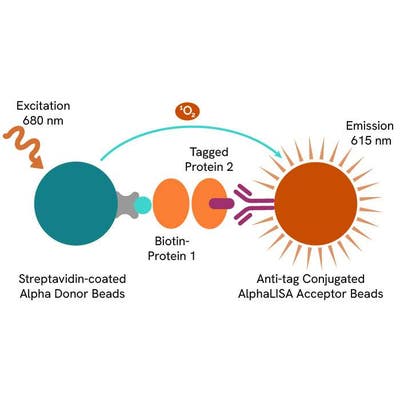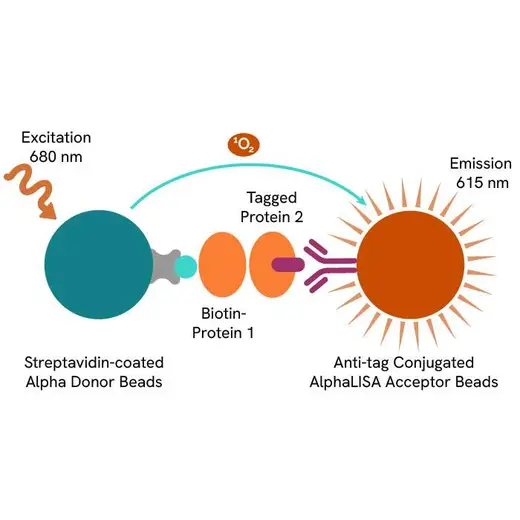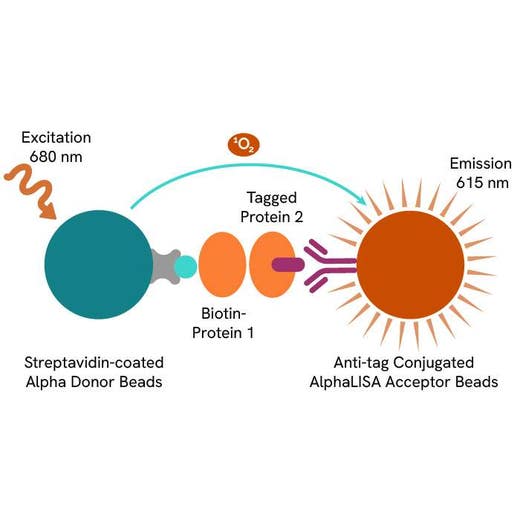
AlphaLISA Human PCSK9 / LDLR Binding Kit, 5,000 Assay Points


AlphaLISA Human PCSK9 / LDLR Binding Kit, 5,000 Assay Points






This kit is designed to assess binding and inhibition of human PCSK9 and LDLR, using a homogeneous AlphaLISA assay (no wash steps). This assay can facilitate the design and development of antibody therapetics using competition assays.
This is a replacement for AL3119.
For research use only. Not for use in diagnostic procedures. All products to be used in accordance with applicable laws and regulations including without limitation, consumption and disposal requirements under European REACH regulations (EC 1907/2006).
| Feature | Specification |
|---|---|
| Application | Protein-Protein Interaction |
| Sample Volume | 5 µL |
This kit is designed to assess binding and inhibition of human PCSK9 and LDLR, using a homogeneous AlphaLISA assay (no wash steps). This assay can facilitate the design and development of antibody therapetics using competition assays.
This is a replacement for AL3119.
For research use only. Not for use in diagnostic procedures. All products to be used in accordance with applicable laws and regulations including without limitation, consumption and disposal requirements under European REACH regulations (EC 1907/2006).



AlphaLISA Human PCSK9 / LDLR Binding Kit, 5,000 Assay Points



AlphaLISA Human PCSK9 / LDLR Binding Kit, 5,000 Assay Points



Product information
Overview
The AlphaLISA™ human PCSK9 and human LDLR binding assay uses anti-6xHis AlphaLISA Acceptor beads to capture the His-tagged PCSK9 and Streptavidin-coated Donor beads to capture the biotinylated LDLR. When PCSK9 binds LDLR, excitation of the Donor beads provokes the release of singlet oxygen that triggers a cascade of energy transfer reactions in the Acceptor beads, resulting in a sharp peak of light emission at 615 nm.
Formats:
- Our 500 assay point kit allows you to run 500 wells in 96-well or 384-well format, using a 20 μL reaction volume.
- Our 5,000 assay point kit allows you to run 5,000 wells in 96-well or 384-well format, using a 20 μL reaction volume.
AlphaLISA features:
- No-wash steps, no separation steps
- Ease-of-use: few addition steps, fast assay development
- Broad range of affinities: detect strong or weak interactions, from pM to mM affinity
- Distance: measure very large protein or antibody complexes – spanning up to 200 nm or more
- High avidity: multiple binding sites on each bead enables use of nanomolar concentrations of antibodies or proteins, as well as use of low affinity binders
Human proprotein convertase subtilisin/kexin type 9 (PCSK9), also known as FH3, HCHOLA3, NARC1 and PC9, is a crucial player in the regulation of plasma cholesterol homeostasis. PCSK9 binds to low density lipoprotein receptor (LDLR) and promotes PCSK9 lysosomal degradation in the liver, thereby reducing LDL clearance. Studies of PCSK9-LDLR binding have aided in the development of therapeutic anti-PCSK9 antibodies that effectively block this interaction at the cell surface. Therefore, blocking PCSK9 and LDLR binding has been considered a promising therapeutic target against cardiovascular disease.
Specifications
| Application |
Protein-Protein Interaction
|
|---|---|
| Automation Compatible |
Yes
|
| Brand |
AlphaLISA
|
| Detection Modality |
Alpha
|
| Product Group |
Kit
|
| Sample Volume |
5 µL
|
| Shipping Conditions |
Shipped in Dry Ice
|
| Target |
PCSK9, LDLR
|
| Target Class |
Binding Assay
|
| Target Species |
Human
|
| Technology |
Alpha
|
| Therapeutic Area |
Cardiovascular
|
| Unit Size |
5,000 Assay Points
|
Video gallery

AlphaLISA Human PCSK9 / LDLR Binding Kit, 5,000 Assay Points

AlphaLISA Human PCSK9 / LDLR Binding Kit, 5,000 Assay Points

Resources
Are you looking for resources, click on the resource type to explore further.


How can we help you?
We are here to answer your questions.






























